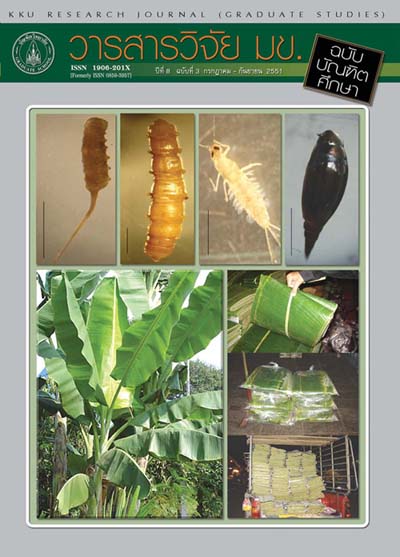Nurses' Knowledge, Attitude and Willingness to Take Care for HIV/AIDS Patients in Bhutan(ความรู้ ทัศนคติต่อเอชไอวี/เอดส์ และความเต็มใจในการดูแลผู้ที่เป็นเอชไอวี/เอดส์ของพยาบาลในประเทศภูฏาน)
Keywords:
HIV/AIDS( เอชไอวี/เอดส์), Knowledge(ความรู้), Attitude(ทัศนคติ), Willingness(ความเต็มใจในการดูแล), Nurses(พยาบาล), Bhutan(ประเทศภูฏาน)Abstract
The purpose of the study was to describe nurses’ knowledge, attitude and willingness to take care for HIV/AIDS patients in Bhutan. A descriptive survey design was used for the study. A Stratified Random Sampling with proportional allocation was conducted to draw the required sample size of 197 nurses from sixteen hospitals in Bhutan. The instrument developed was sent to five experts to assess for content validity and pilot study was conducted in Bhutan prior to data collection to assess for reliability. The data was collected from 15th October to 15th December 2007. The Statistical Package for Social Sciences (SPSS) was used to analyze the data. The over all mean score for knowledge was 24.66 (out of 30); 80.59 (out of 105) for attitude, and 44.85 (out of 50) for willingness. However, nurses had deficit on few aspects of risk factors, pathophysiology and management of HIV/AIDS. Spearman’s correlation showed that duration of HIV/AIDS training had significant positive correlation with knowledge (rs = 0.161, p < 0.05) and with attitude (rs = 0.145, p < 0.05). Knowledge had significant positive correlation with attitude (rs = 0.255, p < 0.01), and attitude had significant positive correlation with willingness (rs = 0.317, p < 0.01). Nurses showed negative attitude on few aspects like blaming the HIV/AIDS people for contracting the disease, as 33.5% of the nurses strongly agreed and 34% of the nurses agreed that ‘HIV/AIDS patients should blame themselves for getting HIV infection’. Nurses had deficit on few aspects of risk factors, pathophysiology and management of HIV/AIDS, as only 34.5% of the nurses could answer correctly to the false statement that the risk of HIV infection from needle stick injury is very high. Only about 53.8% of the nurses answered correctly to the false statement that the HIV/AIDS is highly contagious. Therefore, nurses need to be updated on these areas which could boost their morale, and become confident in executing nursing care to HIV/AIDS patients.
การวิจัยเชิงบรรยายแบบการศึกษาสหสัมพันธ์ครั้งนี้ มีวัตถุประสงค์เพื่อศึกษา ความรู้ ทัศนคติต่อเอชไอวี/เอดส์และความเต็มใจในการดูแลผู้ป่วยเอชไอวี/เอดส์ของพยาบาลในประเทศภูฏาน กลุ่มตัวอย่างได้จากการสุ่มแบบชั้นภูมิ (Stratified Random Sampling) จากพยาบาลที่ปฏิบัติงานในโรงพยาบาลของประเทศภูฏาน จำนวน 16 แห่ง มีพยาบาลที่เป็นกลุ่มตัวอย่าง จำนวน 197 คน เครื่องมือที่ใช้ในการวิจัยเป็นแบบสอบถามวัดความรู้ ทัศนคติ และความเต็มใจในการดูแลผู้ป่วยเอชไอวี/เอดส์ที่ผู้วิจัยสร้างขึ้นและได้รับการตรวจสอบความตรงตามเนื้อหา (Content Validity) โดยผู้ทรงคุณวุฒิ จำนวน 5 คน และตรวจสอบความเที่ยง (Reliability) โดยการนำเครื่องมือดังกล่าวไปทดลองใช้กับพยาบาลที่ไม่ใช่กลุ่มตัวอย่าง จำนวน 30 คน ได้ค่าความเที่ยง 0.710, 0.759, 0.923 ตามลำดับ ระยะเวลาในการเก็บข้อมูลการวิจัย ระหว่างวันที่ 15 ตุลาคม 2550 ถึง 15 ธันวาคม 2550 วิเคราะห์ข้อมูลด้วยโปรแกรม SPSS โดยใช้การแจกแจงความถี่ ร้อยละ ค่าเฉลี่ย ส่วนเบี่ยงเบนมาตรฐาน หาความสัมพันธ์แบบสเปียร์แมน และแบบทดสอบความมีนัยสำคัญทางสถิติด้วยการทดสอบทีผลการศึกษา พบว่า ค่าเฉลี่ยของคะแนนความรู้ ทัศนคติต่อเอชไอวี/เอดส์ และความเต็มใจในการดูแลผู้ป่วย เอชไอวี/เอดส์ของพยาบาลโดยภาพรวมอยู่ในระดับสูง และเมื่อพิจารณาแต่ละด้านทั้ง 3 ด้านก็อยู่ในระดับสูงเช่นกัน โดยมีค่าคะแนนและร้อยละของแต่ละด้าน ดังนี้ ด้านความรู้ค่าเฉลี่ย 24.66 จากคะแนนเต็ม 30 คะแนน ด้านทัศนคติ ค่าเฉลี่ย 80.59 จากคะแนนเต็ม 105 คะแนน และด้านความเต็มใจในการดูแล ค่าเฉลี่ย 44.85 จากคะแนนเต็ม 50 คะแนน และจากการหาความสัมพันธ์ด้วยสเปียร์แมน (Spearman’s correlation) พบว่า ระยะเวลาของการฝึกอบรมสัมพันธ์ทางบวกกับความรู้ (rs = 0.161, p < 0.05) และทัศนคติของพยาบาล (rs = 0.145, p < 0.05) อย่างมีนัยสำคัญทางสถิติ ความรู้มีความสัมพันธ์ทางบวกกับทัศนคติอย่างมีนัยสำคัญทางสถิติ (rs = 0.255, p < 0.01) และทัศนคติมีความสัมพันธ์ทางบวกกับความเต็มใจในการดูแลอย่างมีนัยสำคัญทางสถิติ (rs = 0.317, p < 0.01) พยาบาลมีความคิดเห็นสอดคล้องกับผู้ป่วยเอชไอวี/เอดส์ทางด้านลบ คือมีมุมมองว่าบุคคลที่ติดเชื้อเอชไอวี/เอดส์เกิดจากการกระทำผิด โดยร้อยละ 33.5 เห็นด้วยอย่างยิ่ง และร้อยละ 34 เห็นด้วย พยาบาลพร่องความรู้ด้านปัจจัยเสี่ยง พยาธิสรีรภาพ และการจัดการเกี่ยวกับเอชไอวี/เอดส์ โดยมีเพียงร้อยละ 34.5 สามารถตอบคำถามได้อย่างถูกต้อง ส่วนในด้านการติดเชื้อเอชไอวี/เอดส์ไม่ติดต่อโดยการสัมผัส ไอ จาม พยาบาลสามารถตอบคำถามได้อย่างถูกต้องร้อยละ 53.8 ดังนั้น พยาบาลควรได้รับการอบรม ฟื้นฟู ให้ความรู้ดังกล่าว ควบคู่กับการส่งเสริมด้านศีลธรรมพร้อมกันไปด้วย เพื่อให้สามารถดูแลผู้ป่วยอย่างมั่นใจและเต็มใจ



